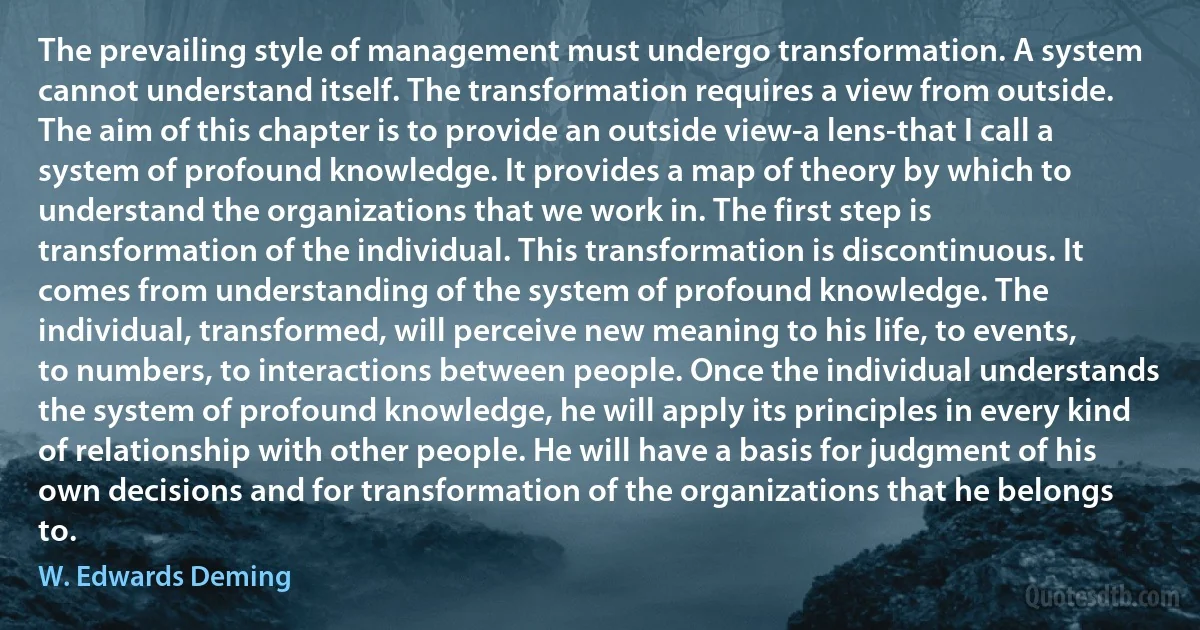
The prevailing style of management must undergo transformation. A system cannot understand itself. The transformation requires a view from outside. The aim of this chapter is to provide an outside view-a lens-that I call a system of profound knowledge. It provides a map of theory by which to understand the organizations that we work in. The first step is transformation of the individual. This transformation is discontinuous. It comes from understanding of the system of profound knowledge. The individual, transformed, will perceive new meaning to his life, to events, to numbers, to interactions between people. Once the individual understands the system of profound knowledge, he will apply its principles in every kind of relationship with other people. He will have a basis for judgment of his own decisions and for transformation of the organizations that he belongs to.
W. Edwards DemingRelated topics
aim call comes judgment kind knowledge life meaning once outside people step transformation understanding view workRelated quotes
[My] approach recognizes the basic principle of a written Constitution. We "the people" adopted a written Constitution precisely because it has a fixed meaning, a meaning that does not change. Otherwise we would have adopted the British approach of an unwritten, evolving constitution. Aside from amendment according to Article V, the Constitution's meaning cannot be updated, or changed, or altered by the Supreme Court, the Congress, or the President. Of course, even when strictly interpreted as I believe it should be, the Constitution remains a modern, "breathing" document as some like to call it, in the sense that the Court is constantly required to interpret how its provisions apply to the Constitutional questions of modern life. Nevertheless, strict interpretation must never surrender to the understandably attractive impulse towards creative but unwarranted alterations of first principles.

Clarence Thomas
Had it merely called to our attention the existence and exact nature of certain fundamental gaps in economic theory, the Theory of Economic Behavior by von Neumann and Morgenstern would have been a book of outstanding importance. But it does more than that. It is essentially constructive: where existing theory is considered to be inadequate, the authors put in its place a highly novel analytical apparatus designed to cope with the problem.
It would be doing the authors an injustice to say that theirs is a contribution to economics only. The scope of the book is much broader. The techniques applied by the authors in tackling economic problems are of sufficient generality to be valid in political science, sociology, or even military strategy. The applicability to games proper (chess and poker) is obvious from the title. Moreover, the book is of considerable interest from a purely mathematical point of view.

Leonid Hurwicz
The term "cult" is always one of individual judgment. It has been variously applied to groups involved in beliefs and practices just off the beat of traditional religions; to groups making exploratory excursions into non-Western philosophical practices; and to groups involving intense relationships between followers and a powerful idea or leader. The people I have studied, however, come from groups in the last, narrow band of the spectrum: groups such as the Children of God, the Unification Church of the Reverend Sun Myung Moon, the Krishna Consciousness movement, the Divine Light Mission, and the Church of Scientology. I have not had occasion to meet with members of the People's Temple founded by the late Reverend Jim Jones, who practiced what he preached about being prepared to commit murder and suicide, if necessary, in defense of the faith.

Margaret Singer
There is a process of slow modification and development mainly in directions which I view with misgiving. "Tory democracy," the favourite idea on that side, is no more like the Conservative party in which I was bred, than it is like Liberalism. In fact less. It is demagogism ... applied in the worst way, to put down the pacific, law-respecting, economic elements which ennobled the old Conservatism, living upon the fomentation of angry passions, and still in secret as obstinately attached as ever to the evil principle of class interests. The Liberalism of to-day is better ... yet far from being good. Its pet idea is what they called construction, - that is to say, taking into the hands of the State the business of the individual man. Both the one and the other have much to estrange me, and have had for many, many years.

William Ewart Gladstone
And yet I think that the Full House model does teach us to treasure variety for its own sake-for tough reasons of evolutionary theory and nature's ontology, and not from a lamentable failure of thought that accepts all beliefs on the absurd rationale that disagreement must imply disrespect. Excellence is a range of differences, not a spot. Each location on the range can be occupied by an excellent or an inadequate representative-and we must struggle for excellence at each of these varied locations. In a society driven, often unconsciously, to impose a uniform mediocrity upon a former richness of excellence-where McDonald's drives out the local diner, and the mega-Stop & Shop eliminates the corner Mom and Pop-an understanding and defense of full ranges as natural reality might help to stem the tide and preserve the rich raw material of any evolving system: variation itself.

Stephen Jay Gould
